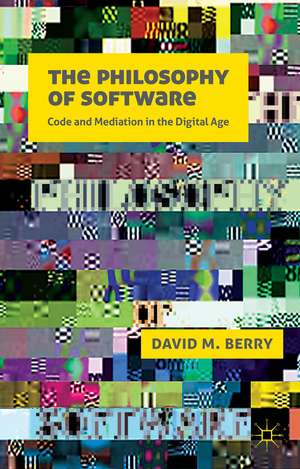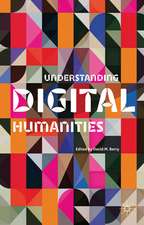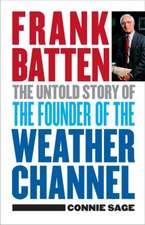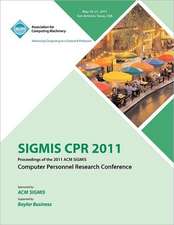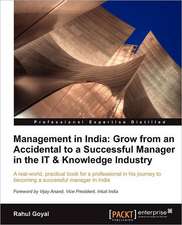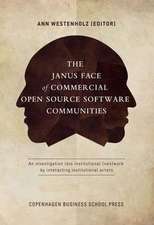The Philosophy of Software: Code and Mediation in the Digital Age
Autor D. Berryen Limba Engleză Paperback – 23 mar 2011
| Toate formatele și edițiile | Preț | Express |
|---|---|---|
| Paperback (1) | 414.42 lei 6-8 săpt. | |
| Palgrave Macmillan UK – 23 mar 2011 | 414.42 lei 6-8 săpt. | |
| Hardback (1) | 389.70 lei 6-8 săpt. | |
| Palgrave Macmillan UK – 23 mar 2011 | 389.70 lei 6-8 săpt. |
Preț: 414.42 lei
Nou
Puncte Express: 622
Preț estimativ în valută:
79.30€ • 83.39$ • 65.52£
79.30€ • 83.39$ • 65.52£
Carte tipărită la comandă
Livrare economică 17 aprilie-01 mai
Preluare comenzi: 021 569.72.76
Specificații
ISBN-13: 9781137490278
ISBN-10: 1137490276
Pagini: 216
Ilustrații: XI, 200 p.
Dimensiuni: 140 x 216 x 15 mm
Greutate: 0.25 kg
Ediția:2011
Editura: Palgrave Macmillan UK
Colecția Palgrave Macmillan
Locul publicării:London, United Kingdom
ISBN-10: 1137490276
Pagini: 216
Ilustrații: XI, 200 p.
Dimensiuni: 140 x 216 x 15 mm
Greutate: 0.25 kg
Ediția:2011
Editura: Palgrave Macmillan UK
Colecția Palgrave Macmillan
Locul publicării:London, United Kingdom
Cuprins
Acknowledgements The Idea of Code What is Code? Reading and Writing Code Running Code Towards a Phenomenology of Computation Real-Time Streams Bibliography Index
Recenzii
'This is a beautifully written book that pulls off the difficult task of introducing the subject of software and the workings of code to the non specialist whilst also providing an original take of the philosophical and the cultural importance of Code in contemporary culture.' - Michael Bull, University of Sussex, UK
'The book is warmly recommended:[Berry's] understanding of software is fantastic. It reaches out to so many discussions and has so many implications that it is an engine in itself: it produces ideas.' - Jussi Parikka, Leonardo on-line
'What is important about The Philosophy of Software is that it really is about what it claims to be about. Rather than trying to shoehorn software into an existing philosophical or political agenda it considers software as a thing in itself and finds those philosophers and philosophical ideas that best address the vitally important phenomenon of software. However much philosophy, computer science or cybercultural theoryyou may know this is a book that will set you thinking about software anew.' - Rob Myers, Furtherfield
'One of the most prolific contributors to the CCSWGs, David M. Berry has also contributed one of the most extensive manuscripts on reading code and code culture. The Philosophy of Software contains chapters on the epistemology and ontology of code, reading and writing code, running code, and the phenomenology of code. Written for a general audience, the book reads several code examples including the Microsoft Windows 2000 source code and obfuscated code competitions.' - Mark C. Marino, Computational Culture, 2014
'The book is warmly recommended:[Berry's] understanding of software is fantastic. It reaches out to so many discussions and has so many implications that it is an engine in itself: it produces ideas.' - Jussi Parikka, Leonardo on-line
'What is important about The Philosophy of Software is that it really is about what it claims to be about. Rather than trying to shoehorn software into an existing philosophical or political agenda it considers software as a thing in itself and finds those philosophers and philosophical ideas that best address the vitally important phenomenon of software. However much philosophy, computer science or cybercultural theoryyou may know this is a book that will set you thinking about software anew.' - Rob Myers, Furtherfield
'One of the most prolific contributors to the CCSWGs, David M. Berry has also contributed one of the most extensive manuscripts on reading code and code culture. The Philosophy of Software contains chapters on the epistemology and ontology of code, reading and writing code, running code, and the phenomenology of code. Written for a general audience, the book reads several code examples including the Microsoft Windows 2000 source code and obfuscated code competitions.' - Mark C. Marino, Computational Culture, 2014
Notă biografică
David M. Berry is Reader in the School of Media, Film and Music at the University of Sussex and Director of the Sussex Humanities Lab, UK. His books include Critical Theory and the Digital; Copy Rip Burn: The Politics of Copyleft and Open Source; Understanding Digital Media and Postdigital Aesthetics: Art, Computation and Design.
